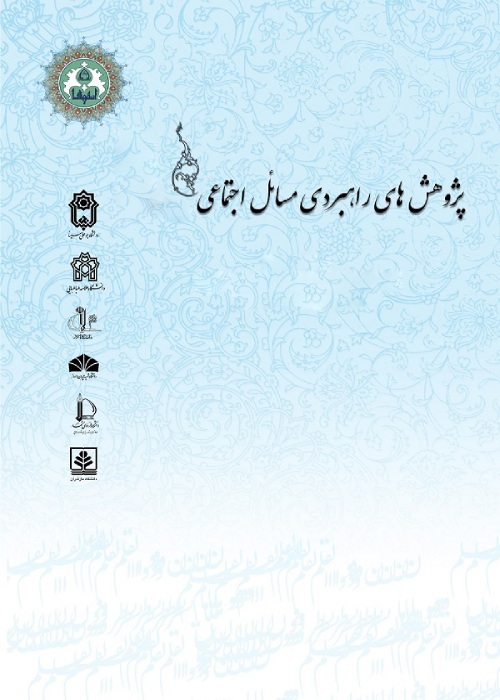The Role of Ethical Leadership in Organizational Loyalty with the Mediation of Work Engagement
Since the university is an academic and cultural institution as well as the pioneer of cultural, social, and economic changes in every society, ethics has been established as a mission to the major universities in the world. Therefore, university deans will build a network of mutual and transcendent relationships that will improve the performance of employees and organizations by observing the principles of ethical leadership. Ethical leaders will make the work meaningful and create work dependency and engagement for their employees. So, the university employees will feel and abide by observing leaders' ethical behaviors regarding work and organization. The ethical behaviors of the deans are an important factor in the development of their employees' engagement and loyalty to the university. So, in this study, the role of ethical leadership in organizational loyalty is studied with the mediation of the employees’ work engagement as an issue in the field of ethics in the management of the academic human resources.
According to the philosophy of the research, this is a quantitative study. Based on its purpose, it is an applied study using the descriptive-correlational method, especially structural equation modeling (SEM) to collect and analyze the data. The study population consisted of 477 experts and managers of Bu Ali Sina University, Hamedan, out of them 387 were experts (81%) and 90 were managers (19%). To estimate the sample size, Cochran formula was used. Therefore, the statistical sample size was 266 and they were selected through stratified random sampling
method:
Brown's, Trovino, and Harrison's (2005) 10-item Ethical Leadership Questionnaire with three factors (Interpersonal Relationships, Modeling, and Pragmatism); Shafley's (2003)17-item Work Engagement Questionnaire with three factors (Vitality, Self-sacrifice, and Job Attraction), as well as, a researcher-made organizational loyalty questionnaire were used. The reliability and validity of the questionnaires were assessed by Cronbach's alpha and confirmatory factor analysis (CFA). Data were analyzed using SPSS and LISREL statistical software. Frequency distribution, mean, and standard deviation tables were used for data analysis. Pearson correlation coefficient and confirmatory path analysis were used to test the research hypotheses. It should be noted that out of 266 distributed questionnaires, 13 were eliminated due to incompleteness and ambiguous information in the data analysis stage, so 253 questionnaires were analyzed.
The results showed that, ethical leadership has a positive and significant effect (0.26) on organizational loyalty (p≤0/05). Work engagement has a positive and significant effect (0.53) on organizational loyalty (p≤0/05). Ethical leadership with direct path coefficient (0.66) and t value (10.74) have a direct, positive and significant effect on work engagement (p≤0/05). Ethical leadership through indirect path coefficient with work engagement satisfaction (0.349) and t value (5.53) has an indirect, positive and significant effect on organizational loyalty (p≤0/05). Ethical leadership can explain 47% of the variance in organizational loyalty. The ratio of X 2/df indicates that the conceptual model fits well with the assessment model. The value of the RMSEA index indicates the acceptable error value. The values of CFI, GFI and AGFI indicate good fit of the structural model.The result of ethics and ethical leadership at the university is the movement to ethics-oriented university, employees’ attraction to work, and their loyalty to the university. In a university where ethics is of particular importance, ethical leadership is always a matter of concern. At this university, ethical leaders are developed and employees willingly embrace ethical patterns and engage in ethical behavior. They are satisfied and proud of their work. Employees who love and are passionate about their work are loyal to their organization and work and have little desire to leave the organization. They are also loyal to their organization, proud of their university and their work.Ethical leaders act as ethical models for followers. By observing the actions and behaviors of ethical leaders, employees learn their principles and patterns of ethical behavior as well as model and reinforce their ethical behavior in themselves. Deans transform the importance of ethics to their subordinates, this makes employees aware of the importance and value of ethics and enhances their understanding of ethical behavior. Ethical leaders use rewards and punishments to encourage desirable behavior, thereby eliminating or controlling unethical behaviors and reinforcing ethical behaviors.
- حق عضویت دریافتی صرف حمایت از نشریات عضو و نگهداری، تکمیل و توسعه مگیران میشود.
- پرداخت حق اشتراک و دانلود مقالات اجازه بازنشر آن در سایر رسانههای چاپی و دیجیتال را به کاربر نمیدهد.




